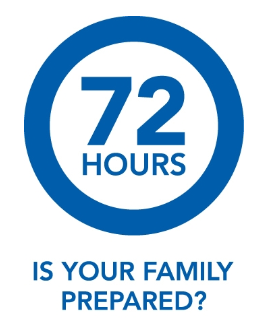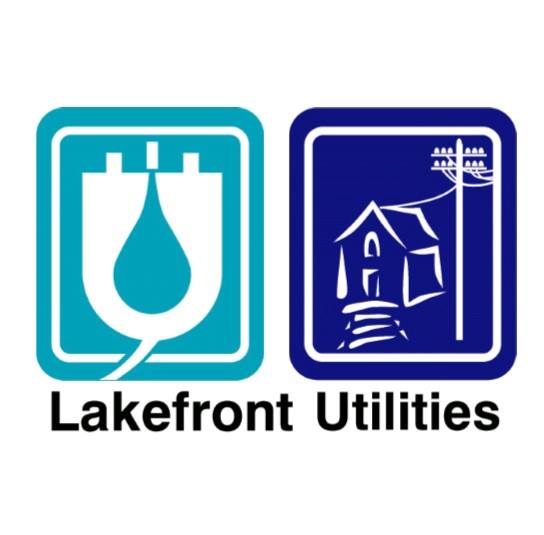EMERGENCY PREPAREDNESS

Know the risks and make a plan
If an emergency happens in your community, it may take emergency workers some time to reach you. You should be prepared to take care of yourself and your family for a minimum of 72 hours.
Click here to download
the Emergency Preparedness Guide
Be Prepared
If a severe weather emergency happens in our community, you may be without basic utilities for long periods of time. It may take emergency workers some time to get to you. After all, they are also battling the same problems that a storm brings.
You should be prepared to take care of yourself and your household for a minimum of 72 hours.
By taking a few simple steps, you can become better prepared to face a range of emergencies that include winter storms, flooding, major power outages and other emergencies that may leave you without basic essentials and services.
Before a Power Outage
Thunderstorms, high winds and snowstorms can create power outage situations that may last longer than a few minutes. They could be widespread and even last for days. You should always be prepared ahead of time for the possibility that you will be without power for a longer period. Before a power outage strikes, consider the following:
- Battery powered smoke alarms need to be regularly fitted with fresh batteries. People often heat their home with wood or other power supply means, which could increase the risk of fire, and permanently wired smoke alarms do not work in a power outage.
- Make sure your home has a working carbon monoxide detector. If it is hard-wired to the house’s electrical supply, ensure it has a battery-powered back-up.
- New handheld phones won’t work without power. Buy an inexpensive handset to plug directly into the telephone jack. You might consider a UPS (uninterruptible power supply) to power or recharge communication devices.
- If a back up generator is in your plans, it should have an ESA inspected transfer capability and fuel on hand to last through a longer outage. Store fuel responsibly and know what devices your generator can supply.
- In the winter, always keep a full tank of gas in your vehicle. This will allow you to drive somewhere that has power when the roads are safe to travel. It will also reduce the risk of gas lines freezing in winter.
- Businesses should consult with an electrician or computer expert to determine the best strategy to deal with critical equipment and data.
- Protect sensitive electrical appliances such as TVs, computer, and DVD players with a surge-protecting powerbar. During an outage, turn all units off and only leave a light on so you know when the power returns.
- Knowledge of appropriate generator safety, food safety and electrical restart procedures are all important.
During a Power Outage
First, check whether the power outage is limited to your home. If your neighbours’ power is still on, check your own circuit breaker panel or fuse box. If the problem is not a breaker or a fuse, check the service wires leading to the house. If they are obviously damaged or on the ground, stay at least 10 meters back and notify Lakefront Utilities. If your neighbours’ power is also out, please notify Lakefront Utilities at 905-372-2193.
During storm events, if you see a tree or other object on a power line or sparking equipment on poles, please notify Lakefront Utilities at 905-372-2193. If you see downed power lines, do not go near them. Call 911.
What to do during a power outage:
- Turn off all tools, appliances and electronic equipment, and turn the thermostat(s) for the home heating system down to minimum to prevent damage from a power surge when power is restored. Also, power can be restored more easily when there is not a heavy load on the electrical system.
- Turn off all lights, except one inside and one outside, so that both you and hydro crews outside know that power has been restored.
- Don’t open your freezer or fridge unless it is absolutely necessary. A full freezer will keep food frozen for 24 to 36 hours if the door remains closed.
- Never use charcoal or gas barbecues, camping heating equipment, or home generators indoors. They give off carbon monoxide. Because you can’t smell or see it, carbon monoxide can cause health problems and is life-threatening.
- Use proper candle holders. Never leave lit candles unattended and keep out of reach of children. Always extinguish candles before going to bed.
- Listen to your battery-powered or wind-up radio for information on the outage and advice from authorities. If these are not available, you may choose to monitor broadcast media using your car radio.
- Listen to the radio. Local media are provided with the most current information about larger power outages. When a major outage is taking place, watch social media for updates.
- Always keep emergency numbers near your telephone for easy reference.
LOCATION
207 Division Street
PO Box 577
Cobourg, Ontario
K9A 4L3
Call Us
(905) 372-2193
FAX US
(905) 372-2581
